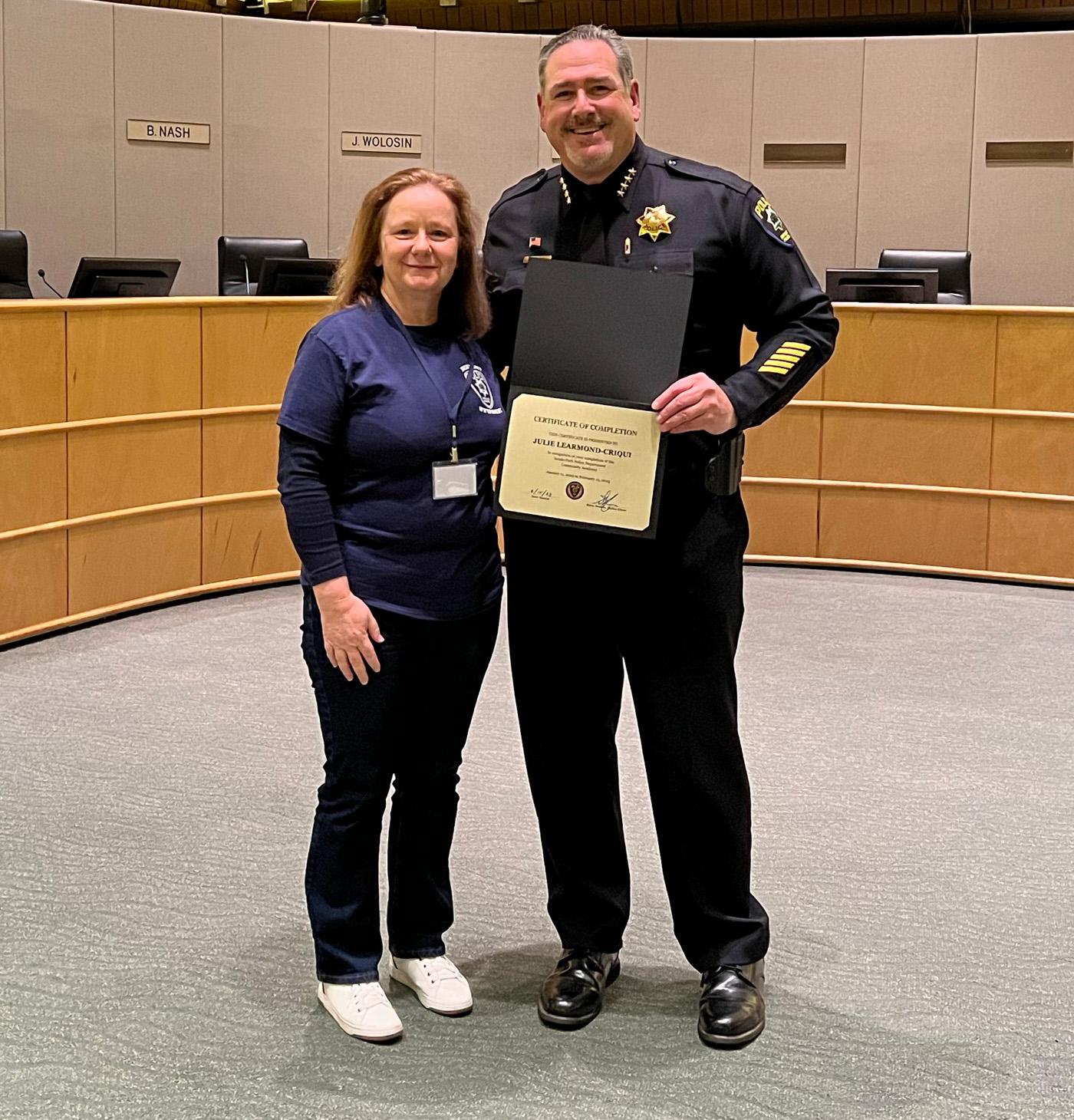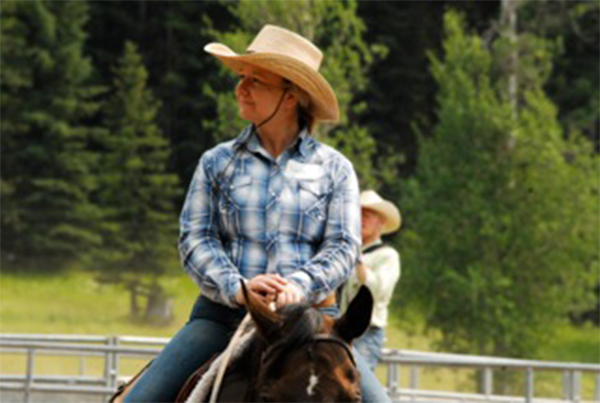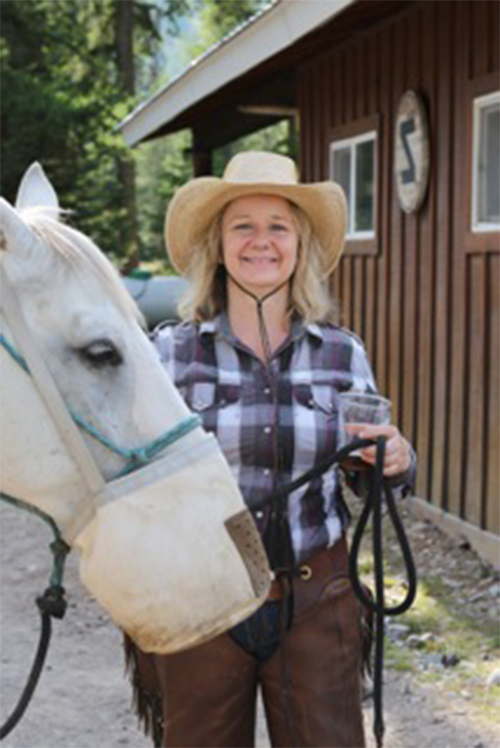Articles
What we’re contemplating, doing, and reading.
Staff Spotlight: Julie Learmond-Criqui, Program Director, Courageous Heart
Julie (left) receiving Community Academy Certificate from Chief Norris (right)
Compassion Institute (CI) is honored to introduce our committed staff who are developing and delivering compassion-based programs that promote personal and societal well-being.
Our Courageous Heart: The Human Behind the Badge program features resilience, compassion, and leadership training for law enforcement and public safety personnel. Below, you have an opportunity to get to know Julie Learmond-Criqui — our dedicated program director for these offerings — which have been Certified by the Commission on Peace Officer Standards and Training (POST) in the State of California.
Additionally, you’ll discover Julie’s unique perspective on compassion after six years of experience contributing to several key program areas at CI.
Where did you grow up and how did it impact your interest in compassion?
I grew up in England. I was very blessed to be surrounded by close family who lived their lives from a centerpoint of compassion on a daily basis — even though the term “compassion” was never used. It was just what they did. It was a beautiful way to see and experience the positive effects of this quality from the beginning. The schools I went to were similar, so I was taught by teachers who also exhibited the attributes of compassion.
From a very early age, I was always adventurous. I wanted to explore, learn, and meet people from other countries and all walks of life. I did not want to do things the way they were typically done. Starting around the age of 10 I traveled independently, and then I spent a lot of time in France in my teens before eventually moving there. Having friends from several different countries, I was fortunate to see and experience life first-hand from many different cultural viewpoints and perspectives which deepened my sense of shared common humanity. In recent years, I have been privileged to call the United States my home.
What does compassion mean to you?
Compassion means living from a place of kindness and integrity, with the deep internal motivation to contribute to making things a little better by taking a compassionate approach. This could be for an individual, a situation, an organization, or a community. It means standing strong, while being willing to be vulnerable. It means respecting others, and yourself. It also includes a recognition that choosing compassion is not always easy; it takes commitment, resolve, and practice. Ultimately, for me, compassion means having access to greater peace and joy.
What drew you to compassion training and working at Compassion Institute?
I was drawn to compassion training having taken the 8-Week Compassion Cultivation Training© (CCT™) course in-person at Stanford University in the fall of 2015. In a class of 40 adults of different ages, backgrounds, and varied professions, I experienced a deepening of my own understanding of how I lived my life and what was important to me. I also felt a strong pull to how this work could elicit positive change in the world, and how I could potentially contribute.
Our instructor, Robert Cusick, taught us new skills, while deeply embodying the training. He reinforced the essential fact that practicing compassion is not superficial nor always easy. In fact, it can be really challenging and difficult, and something we will often fail at. The point is the practice itself — not the grasping for an unattainable state of perfection in an imperfect world.
At the time, I had spent a good portion of my career in the tech industry, which was (and continues to) suffer from systemic burnout of personnel. After taking CCT™, I could not stop thinking about the personal and wider impact of consciously choosing compassionate action in the workplace. And I immediately saw how trainings like this could help transform the work environment and cultivate sustainable ways to achieve excellence, but within healthy and supportive cultures.
What is your biggest "aha" moment with compassion?
Realizing that so many people are not in environments or around others who show them compassion. It is a tough ask of someone to constantly model and give compassion, without receiving it sometimes. And yet many do find a way to do it. In our resilience and compassion training classes for law enforcement, I have frequently witnessed students’ relief when learning new information, skills, and perspectives that can help relieve burnout and on-the-job stress. Our courses aim to offer an environment where tough conversations can take place, and where the skills that are offered can support positive change, hope and empowerment.
What about compassion surprised you?
When I first took CCT™, I remember being blown away by the concept of self-compassion. It was very uncomfortable, in every sense. The thought of spending any time purposefully attending to my own well-being was an alien concept. And it is one which many people, particularly in the West, have trouble coming to terms with. There can be the assumption and surface interpretation that self-compassion equates to self-indulgence and selfishness, but there are several studies that have shown us this simply is not true.
As the program director for Law Enforcement & Public Safety, what transformations have you personally witnessed?
The Law Enforcement and Public Safety community is very close to my heart. My father began his career as a police officer in the London Metropolitan Police. Both of my grandfathers were in the United Kingdom military — the Royal Air Force and the British Army — and served in the Second World War, and beyond. Most of us who have not served in these types of organizations or roles really have no idea how truly difficult they can be. There is typically incredible sacrifice involved as well as the adverse effects on individuals and their families, both physically and mentally. Certainly, in our family, these topics were never discussed.
As a society in the West, we are fed films and TV programs that frequently misrepresent reality and distort perceptions. In all occupations and walks of life — there are some people who do not uphold the high standards required of them. And while in some cases people do deliberately set out to cause mental and physical harm to others, applying this broad lens to everyone in a specific profession, including law enforcement, is flawed and harmful.
Attending the Community Police Academy in my hometown here in the US was an incredible opportunity to learn and meet officers from across the agency, and hear first hand how they approach their roles and the challenges they face. Building relationships with the policing community — with the staff, officers and professionals in the field — has provided humbling insight into their jobs and their needs, and to the constant pressures and stresses of the profession.
As a program director and a course facilitator, I have had the honor to meet and work alongside incredible people in law enforcement and compassion training. Together, we co-created the Courageous Heart: The Human Behind the Badge training courses that CI has been delivering since 2018. Law enforcement is a tough culture. And when we started, talking about resilience and compassion — let alone teaching it — was unheard of.
We have witnessed many life transformations over the past years, including people who have completely changed their perspectives, staying in law enforcement when they were at the point of leaving; making time and giving priority attention to their own personal wellness and their relationships with close family and friends; and some even deciding not to end their marriages. Their stories have, and continue to be, very inspirational. And we are in a constant state of gratitude that these men and women are willing to put their own safety on the line for us, their communities.
With the support of organizations like Peace Officers Standards and Training (POST) in California, and the pioneering vision and strong leadership of law enforcement executive, Sheriff Robert Jonsen, the driving force behind starting our Courageous Heart program — the topic of mental wellness has become an acceptable as well as relevant issue to address. In California, key law enforcement organizations such as the California State Sheriffs Association (CSSA) and the California Police Chiefs Association (CPCA) each have a dedicated Wellness Committee, actively addressing the need for resources and support within agencies.
What is your background related to your work at Compassion Institute?
Most of my career was spent in PR, strategic marketing, and launching / positioning companies and products in the technology industry. I was fortunate to work creatively with passionate and innovative people who wanted to forge new paths in their industry — advancing human capability and understanding — and ultimately creating change. At Executive Education at Stanford University, I translated organizational and training needs into effective programs that nourished employees, helped initiate cultural shifts, and solve internal problems.
Alongside my working life, I’ve had my own contemplative practices, and have studied several modalities. In 2023, I was deeply honored to graduate as a Certified Compassion Cultivation Training© (CCT™) Teacher, and I look forward to continuing to be of service in that capacity.
I love to create new approaches and offerings in new sectors as well as foster and support positive change. And this is what we are doing at Compassion Institute.
What component of CCT™ do you use most in your everyday life?
CCT™ is an amazing course that really covers the range of compassion practices in a way that is easy to apply to your own personal life and situations. I definitely use them all, however, the practice of common humanity is a constant. This technique uses the phrase “just like me” in mediation practice to help connect with the humanity we all share.
How do you think the world could change if everyone had this training in school?
Reading, writing, math/computer science, and compassion training. I see these four as the fundamental disciplines. I think compassion training has the potential to offer critical skills that can support and sustain healthy people, communities, countries, and the world!
What would your friends, family, or co-workers say has changed about you since starting your compassion training journey?
Friends and family would not have noticed a big change in who I am or how I go about things, although the training has taught me a tremendous amount. As I mentioned above, compassion was how our family operated and how we were brought up to engage with the world. The one thing they would probably say is that I talk about it, openly, and often.
Is there anything else you'd like to share with others?
There are plenty of misconceptions out there about what practicing compassion really is or what it means in practical terms. For example, it is often assumed (misinterpreted) to be a weakness, or it somehow means you condone or agree with the bad actions of another. Compassion training reveals that this is simply not true. The ability to practice compassion is a strength we can cultivate, and it takes courage to do it. It takes being willing to be vulnerable. In return, we can be rewarded with deep joy, and a real sense of hope for humanity.
When appropriate in your own community, please consider saying “thank you for your service” when you see a police officer, a public servant, or a member of the military. This recognition and small act of compassion can go a long way. People who serve in these roles are rarely on the receiving end of appreciation and gratitude as they are typically meeting us in our very worst moments. As humans, we are all connected. Please consider extending this simple kindness to your fellow human.
You’re invited to enroll in one of our upcoming programs today:




